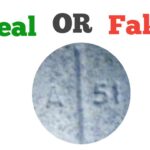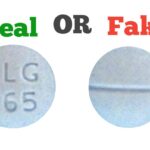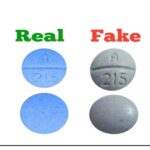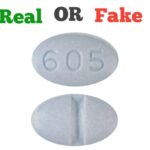How to Spot Fake K 9 Blue Pill
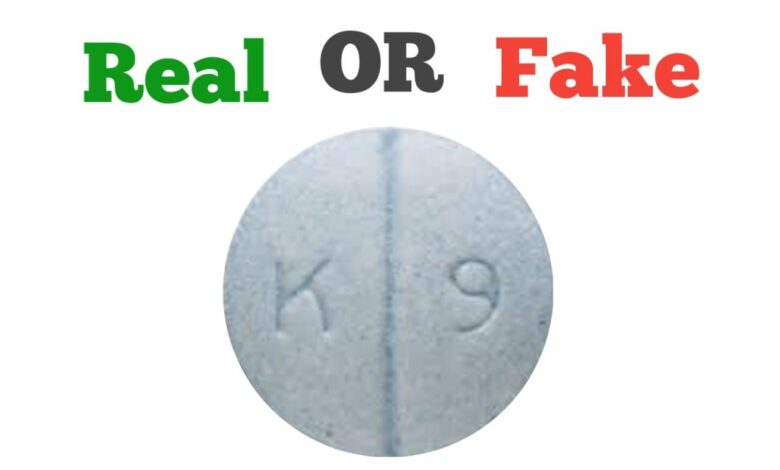
The blue round pill with the imprint K 9 has been identified as Oxycodone Hydrochloride 30 mg. It is supplied by KVK Tech Inc.. Oxycodone is used in the treatment of chronic pain; pain and belongs to the drug class narcotic analgesics.
Oxycodone 30 mg is classified as a Schedule 2 controlled substance under the Controlled Substance Act (CSA). Substances in the DEA Schedule 2 have a high potential for abuse which may lead to severe psychological or physical dependence. Oxycodone is classified by the DEA as a Narcotics (Opioids) drug. Street names for Oxycodone are Hillbilly Heroin, Kicker, OC, Ox, Roxy, Perc, and Oxy.
Fake fentanyl laced pills has become the new normal on our streets. Fentanyl is a powerful synthetic opioid that is similar to morphine but is 50 to 100 times more potent. Drug dealers are producing fake pills laced with fentanyl because it takes very little to produce a high with fentanyl, making it a cheaper option. This is especially risky when people taking drugs don’t realize they might contain fentanyl as a cheap but dangerous additive. They might be taking stronger opioids than their bodies are used to and can be more likely to overdose. Mortalities due to fentanyl derivatives are on the rise with novel fentanyl analogues wrecking havoc on a global scale.
How to spot fake K 9 Blue pill
Studies have shown that poor quality medicines represent a global threat to the public health that can result in treatment ineffectiveness, drug resistance, increased morbidity and mortality rate, economic loss and problems to the healthcare system.
As a consumer, you may not have access to most of the test equipment used by regulatory bodies to verify the identity of a drug product. The following tips will serve as a guide to purchasing genuine K 9 pills and help you avoid fakes;
Visual inspection
Visual inspection as stated by the World Health Organization (WHO) (1999) still remains the first step in identifying potential fake drug irrespective of the analytical methods used. This is because such observation serves as a lead to identifying fake products even in the absence of the knowledge of the physical characteristics of a genuine drug product. You are expected to examine carefully both the package and its content before purchase or use.
Visual inspection of the Package
You should:
- Examine the package and check if it appears suspicious or different from what you previously know.
- Check if the security seal has been tampered with by looking for breaks or tears in the sealing tape and seals.
- Look for unusual fonts, font sizes, print color, and spelling errors.
Visual inspection of the Dosage form
At this stage, you are meant to check for differences in the physical appearance (color uniformity, size, shape, consistency etc.) of the drug. As stated by WHO, commonly encountered physical defects that should be looked out for in tablets include:
- Excessive powder and/or pieces of tablets at the bottom of the container (from abraded, crushed or broken tablets);
- Cracks or chips in the tablets, swelling, mottling, discoloration, fusion of tablets;
- Appearance of crystal on the walls of the container or on the tablet.
Source
The source of the drug also determines if you are buying a fake K 9 pill or not. Buying a foreign K 9 pill exposes you to a lot of risk. Filling your prescription in a reputable pharmacy greatly reduces your chances of buying fake drugs while buying from illiterate and unqualified vendors who hawk drugs in buses, motor parks and in the streets increases your chances of buying fake drugs.
Price
This is another way of identifying fake K 9 pill. If the price is far cheaper than what is expected, then you have to think twice. However, this may not always be true especially for some products (fake innovator/generic brands) which may be sold at the same price as the genuine one.
Unexpected side effect
Counterfeit K 9 pill most of the time contains substances other than the appropriate Active Pharmaceutical Ingredient (API). They may contain incorrect substances, improper dosage or hazardous substances like fentanyl which produce unusual side effects, worsening medical condition after taking it. The medication should be stopped once any of the above is noticed.
Fentanyl Test
Fentanyl testing is one of the most reliable ways of telling a fake from a real K 9 pill. A new University of Maryland study found fentanyl tops the list of drugs detected in overdose patients at two Baltimore hospital emergency departments. The finding suggests that hospitals and medical systems throughout the United States consider adding fentanyl, a potent synthetic opioid linked to most fatal overdoses in Maryland, to their routine drug testing panels. That is the conclusion of researchers at the University Of Maryland School Of Medicine (UMSOM) and the Center for Substance Abuse Research (CESAR) at the University of Maryland, College Park. Currently, fentanyl is not routinely included in these panels nationwide. The procedure described below can help law enforcement agents and public health officials to pick out fentanyl laced powders and pills.
Steps
- Crush pill or pour powder into a clean bowl or test tube
- Add ¼ inch of clean water to the powder in the tube or bowl and mix properly
- Dip the end of the test strip into the residue for 15 seconds, remove, and lay on a clean flat surface
NOTE: If the strip does not either have one or two lines, the test is invalid.
According to the Pharmaceutical Research and Manufacturers of America, consumers who purchase medications online should avoid the following: sites that are located outside of the U.S. that do not indicate any physical address; sites that do not have a license by the relevant State Boards of Pharmacy; sites without a licensed pharmacist to answer questions; and websites that do not require a prescription.
Consumers who wish to purchase drugs over the Internet should look for websites that have the Verified Internet Pharmacy Practice Sites seal. These sites, which are created by the National Association of Boards of Pharmacy, are licensed pharmacies selling FDA-approved medications to discourage the sale of counterfeit drugs from illegitimate online sources.

